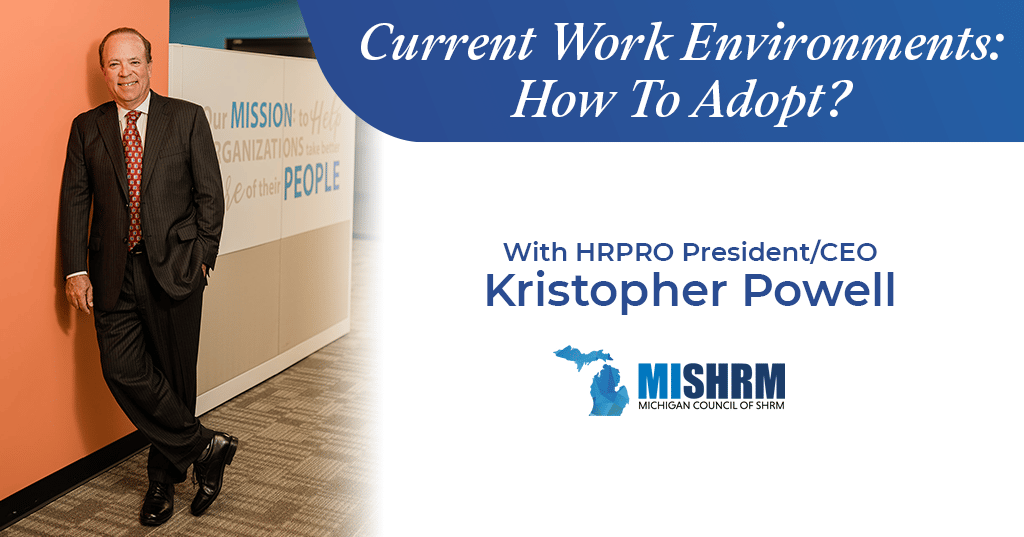
Podcast: Adopt Your Work Environments in 2022
The MISHRM Resource Partner Podcast is all about spotlighting the Resource Partner organizations that go above and beyond to serve your company’s HR needs.
RP Podcast Episode 10: Kris Powell, President/CEO of HRPro
Greg Coyne: I want to hear what your company is all about and how you differentiate yourself in the world of HR and benefits.
Kristopher Powell: We work with companies a lot these days, especially the real challenge today is to get employers ways to better attract and bring in talent. It is very demographic. We have a lot of baby boomers who are retiring. In fact, there are about 35 or 40 million. These are people who were born in that 56 to 62 era. We started experiencing a decline in live births in 2000, so the number of people to replace them is inadequate.
We’ve faced some really big challenges and it’s not something that’s about to go away anytime soon. If you look at the demographic numbers right now, this will be an ongoing phenomenon for years to come. We really work with employers to identify ways to better attract and retain that talent. How do they build their employer’s brand? How do they make things look better? What do they do in terms of their benefit programs, and their HR programs?
We try to cut out a lot of waste in many areas. We also streamline areas so that we can fund HR to focus on number one. Which is helping the employer to build the culture but also be more strategically involved with what’s going on in a company as opposed to shuffling papers. We’re all about streamlining.
When you look at the medical cost we’re all about eliminating and getting rid of a lot of the waste in that and our most successful clients are achieving 25 to 30 percent cost reductions because of what we’re doing by eliminating that’s just that and not cutting back benefit programs, or increasing deductibles making it more painful for the employee. You don’t want to do that, especially in this environment. Sure people are fed up with that so how do you attract people?
Let’s be serious. There’s the other part. This is because of all the inflationary pressures on wages right now people are looking to get eight to ten percent increases in pay every year. If you’re an employer, you’re in a competitive market, and your margins are already compressed. How are you supposed to pay people eight to ten percent more? The only way you’re going to be able to do it is to look at: how I streamline, how I reduce waste, and how I get things where they need to be.
To a degree I think we’re moving into an area where we’re more likely to be helping a lot of employers survive, survival is dependent, upon having good people on board and the ones that survive are going to be the ones that are able to figure out ways to reduce costs so they can focus more on getting their people costs taken care of and not just throwing money away on stuff.
I heard some crazy statistics the other day. In the next three years so in 2025 and 75% of the workforce will be millennials and gen z. A lot of that in terms of building a culture and getting and getting the right talent is going to be key.
Greg Coyne: In that regard, you talked about being able to help reduce that investment and a lot of the waste. What are the minor benefits of being in it all the time that could compensate for not giving all you know?
Kristopher Powell: Behind the scenes, without giving away the secret sauce. We offer this item on its own: prescription drugs. The amount of ridiculous costs involved in prescription drugs for the majority of employees is we’re actually doing something. In 30 years, I’ve actually never seen a trend line that’s going down on prescription drug costs.
We’re focused on where they’re being sourced and whether they are the right drug so we’ve brought in clinical management and we’ve also brought in if you understand what manufacturer’s assistance is where people can get either coupons or high-end drugs largely paid for by the manufacturer. Canada is also a source for us and Canada has additional resources in New Zealand, Australia, and Britain without going into too much detail.
That’s a 30 to 80 savings big pharma doesn’t want to hear! There are ways to do it, and for our largest and most valued clients, we have established a trend that is actually decreasing by about 8-10 percent.
Again, this is one of those areas where you focus on where the waste finds the junk, then pursue the junk and cut the fat. We know people want to have reliable, solid health care plans, but you don’t want to have to pay an arm and a leg to have them have those.
Greg Coyne: I’m always curious especially knowing that you’ve been in the industry for some time. How did you even get involved? I don’t think people see HR employee benefits as sexy when they talk to me about them. But at the same time, it is ever-changing and it’s vital to the success of any business.
Kristopher Powell: This is ancient history. I started the insurance business out of college. Let’s talk about getting into the non-sexy business at the age of 22. But you know, I basically gravitated towards being on the benefit side, it made more sense. I wanted to do more B2B, so that was where I found a home and started the company in 1990. I have built it up from there.
Initially, we provided benefit consulting services, but now we provide Benefits Administration services. From there, we moved into HR Administration, and then from there, we moved into HR Consulting. Working with folks to either source out pieces of things to make sure they’re being done most efficiently or trying to get rid of some of the paper shuffles. This is done by applying different technologies.
We’re a small company. We have about 34 employees. It gives me an unusual view as a CEO in terms of how I am taking care of my people. I also know what I’m doing for my folks.
Our goal is to enhance and build our culture. We’ve been in Crane’s Top 100, Coolest Places to Work. Approximately 75 percent of your grade is based on employee responses, and 25 percent is based on your HR practices.
I guess when you own an HR company, you should have reasonably sound HR practices. However, we’ve tried to make sure to create a paragon environment. We talk to people about how they’re taking care of their people. We want to make sure that our people are well taken care of and that pays dividends. When employees like coming to work and they enjoy co-workers and we have a positive environment to work in, there’s a whole different sense of things when we pick up the phone and say hello. Our comprehensive attitude and everything else that bleeds through has been one of the reasons for our growth.
The type of environment where people can really feel at home. They can feel like they belong to their part of the family there. That’s awesome. I love hearing that I’m an upside-down pyramid guy: my job as the CEO is to support my leadership team, and their job is to support the folks who are customer-facing and building your own strong culture. If you look at where the environment has moved people are looking for flexibility. We’ve moved with everybody having to be in on Wednesday. This is a very effective way to build a culture, but everyone has to be in one day a week and then they have to be in two other days a week. It’s worked out great for our folks.
The flexibility we’re working on rolling out a tuition assistance program. Not just tuition assistance, and student loan reimbursement. It’s non-taxable to them for their student loan reimbursement and tax-deductible to you as an employer. We’re hoping to marry that with some lifestyle accounts. This is another way to allow people the same tax advantages as saying a flexible spending account or a health savings account. A few years ago I read a thing where they said most employees the single biggest thing they’re looking for are Friday afternoons off in the summer. We did that since the inception of the company back in 1990.
Greg Coyne: I feel like this is a good transition based on some of the things you just said. You’re ever-changing but you’ve had the ability and the opportunity to learn a lot through the career, so if there’s one thing and what are some of those things that you’ve learned in terms that you would pass on to maybe a younger you or someone else that’s just starting out owning their business. What is some kind of career lessons that you’ve taken with you?
Kristopher Powell: My biggest change was that I was a really really good salesperson. At some point, I said okay as this company is growing I can’t just continue to sell and assume that that’s going to fix all the problems. At some point, I had to transition to being a really good team leader and that took a while. Being a good team leader and really building a company as opposed to just selling. I was really good at that and building up a team and knowing and understanding how to do that.
I’m a big advocate of Patrick Lencioni “The Five Dysfunctions of a Team” and everybody that starts with us get a copy of the book. They need to read and understand what it is we’re working towards.
I think a big part of our success as entrepreneurs is you obviously still love sales and you’re still changing the business. Therefore, if there’s one thing that you want to be remembered for what would it be being a good team leader? For building up a great environment where people feel they’re coming to work at a place that they really love. Our turnover is minuscule, but we lose more people to moms who decide to stay home.
We’ve had really good people that we know are really solid we’ve worked it out so that they’re working remote or they’re working part-time, been that flexible, and it’s really based on the team leader person who is working with them coming to me and saying listen I really want to keep this person but they’re about being a mom.
From a turnover standpoint, we lose people more because they move out of the area, not because they want to leave the company.
We created an environment that allows and provides for people wanting to stay and produce, both from the sales side and also from the work environment side.
Greg Coyne: You guys have done a great job over there and I believe that speaks a lot to your leadership in the company. Thank you and with that let me ask how they can get in touch with you.
Kristopher Powell: The good old-fashioned way is to pick up the phone and call. Does anybody actually do that? (248) 543-2644 or visit our website hrpro.com either one of those websites to access more information and see how we can help your company prosper.
p.s. Are you wearing multiple HR hats just to survive the day?
This Free Complete HR Checklist will help you evaluate your HR & Benefit practices & identify the gaps you need to focus on first.






